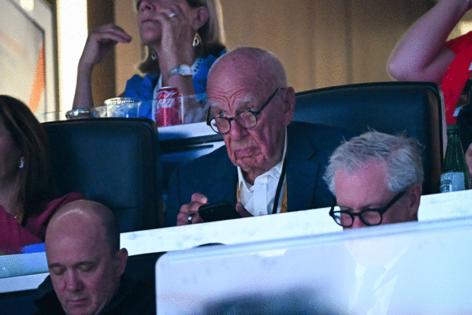LZ Granderson: Trump's election says a lot about trust in journalism
Published in Op Eds
It's easy to forget that while the first Watergate article appeared in the summer of 1972, Richard Nixon did not resign until 1974.
Over the course of those two years, Nixon won reelection in a historic landslide, mocked journalism and threatened the Washington Post repeatedly. It wasn't until the Supreme Court ordered the release of tape recordings related to the scandal that Nixon acknowledged the reporting was true and resigned in shame.
Something else happened during these two years as well: The Australian media mogul Rupert Murdoch bought his first U.S. newspaper — the San Antonio Express-News — and he moved to New York.
Fascinating timeline, isn't it? As the true power of journalism was emerging in the country, Murdoch came to America to pervert the field, just as he had done in other countries with a free press.
Before Watergate, Nixon had often fantasized with his top aide Roger Ailes about running his own conservative television network. Murdoch was already known in his country and Europe for using his newspapers to push a conservative agenda using misinformation. Murdoch's impulses and Nixon's seemed almost destined to unite eventually, and indeed, decades later when the mogul made the former president's dream come true by creating the conservative network Fox News, Ailes was hired to run it.
A couple other pieces had to fall into place first though. President Reagan obliged. In the '80s, Reagan expedited Murdoch's immigration status, so that as a U.S. citizen, he could buy more of America's media companies. As he took power, Murdoch leaned on editors and producers to reflect his political views and not the truth that journalists found through reporting.
Reagan also pushed to repeal the Fairness Doctrine, which had required holders of broadcast licenses to represent multiple sides when covering controversial issues. Freed from that, Murdoch's television stations could say they were "fair and balanced," but they were no longer required by law to actually be so. You know what came next, with the rise of Fox News and the decline of an informed public.
While the 1st Amendment clearly protects the free press, what it cannot do is preserve the public's trust in the free press. That's up to the industry, and in short, we failed. Donald Trump's return to political power through last week's election is just the latest byproduct of that failure.
The decline in trust of journalism was carefully orchestrated. One man who worked for the Heritage Foundation in the '80s and advocated for repeal of the Fairness Doctrine, James Gattuso, would go on to become a top official at the Federal Communications Commission under the first President Bush.
That would be the same Heritage Foundation that is behind Project 2025, the conservative blueprint to reshape the federal government around Trump.
Carl Bernstein, who with Bob Woodward had broken the story of the Watergate burglary and Nixon's involvement, wrote in a magazine piece in 1992 titled "The Idiot Culture": "In retrospect, the Nixon administration's extraordinary campaign to undermine the credibility of the press succeeded to a remarkable extent, despite all the post-Watergate posturing in our profession. It succeeded in large part because of our own obvious shortcomings. The hard and simple fact is that our reporting has not been good enough. It was not good enough in the Nixon years, it got worse in the Reagan years, and it is no better now. We are arrogant. We have failed to open up our own institutions in the media to the same kind of scrutiny that we demand of other powerful institutions in the society. We are no more forthcoming or gracious in acknowledging error or misjudgment than the congressional miscreants and bureaucratic felons we spend so much time scrutinizing."
The blurring of lines between hard news and opinion — coupled with "hot takes" that have replaced a lot of reporting and informed analysis — has brought billions into corporate media. The industry has more consumers now than ever before, in more media. However, journalism has been hurting in the process for decades.
It all contributed to what we saw last week, when a majority of American voters backed Trump either because they hadn't heard of his worst failings — which is hard to imagine — or because they did not know whether to believe or how to interpret what they had heard about his failings. That sort of world of distrust and confusion is exactly what Gattuso/Reagan/Murdoch/Ailes had hoped to create, so that criminals like Trump could not be held accountable by a free press as the founders intended.
The questions regarding what Democrats did wrong in this election are certainly worth asking. However, the industry of Woodward and Bernstein is in dire need of analysis as well. More than 70 million Americans apparently trusted the words of Trump, a serial liar, and embraced his "fake news" characterization of the industry. There's no getting around it: The 2024 election did not just reflect a new high point for Trump, but also a new low for trust in American journalism.
_____
©2024 Los Angeles Times. Visit latimes.com. Distributed by Tribune Content Agency, LLC.




























































Comments